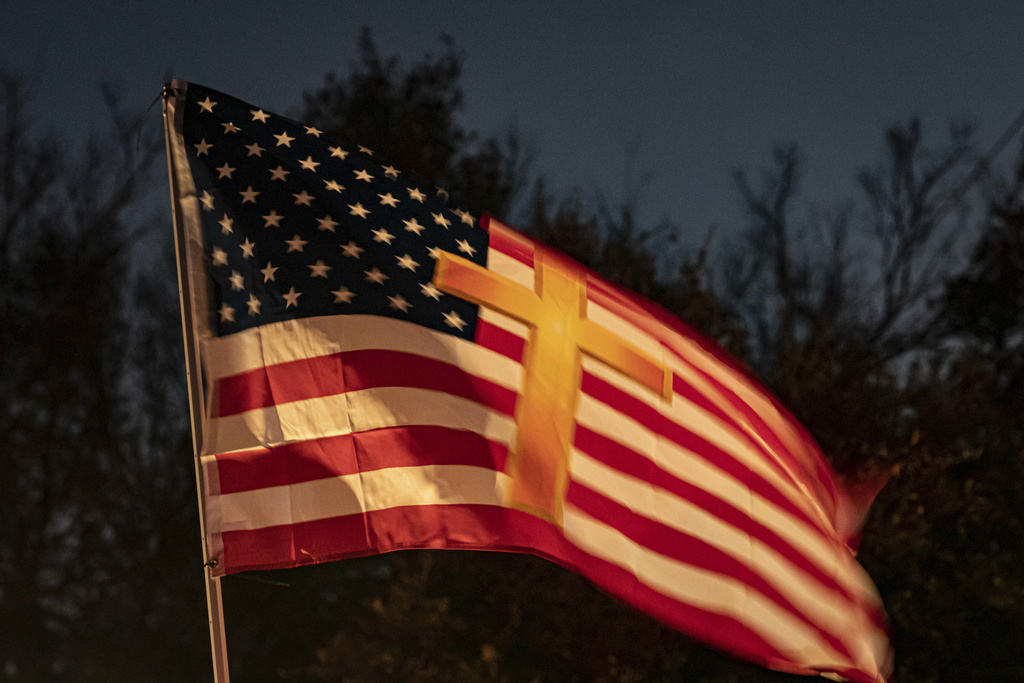

The term “Christian Nationalism” has been used by the Left as a means of dismissing social conservatives who believe in the role of religion — or Judeo-Christian values — in everyday American life. In this series, Faith and Flag, the Washington Examiner will analyze what it actually means to be a ‘Christian Nationalist,’ why the term is maligned and misunderstood, and what role, if any, it might play in a future Trump administration. Part one looks at what Christian nationalism is.
As the phrase “Christian nationalism” has weaved its way into political discourse, the Left has used it to paint a caricature of a dogmatic Republican voter base focused on stripping rights from Americans.
The 2024 election cycle has featured a left-wing focus on the phrase as Democrats raise the specter of a second Trump administration running roughshod over the secular liberal order that has become, according to conservatives, decidedly anti-family, anti-American, and un-Christian.
Although conservatives differ on the precise definition of Christian nationalism, its proponents generally describe it as the view that society, culture, and politics should be guided by the Christian moral ethic that informed America’s founding and played a prominent role in its history until the middle of the 20th Century.
The ‘fearmonger’ Left
Some liberal commentators try to liken Christian nationalism to white supremacy and argue, as MSNBC’s Joy Reid suggested on Feb. 20, that Christian nationalism means “shooting migrants at the border, full immunity for police to kill at-will … terminating the Constitution, bombing Mexico,” and “stripping women of all of their personal rights.”
Harvard professor Steven Levitsky claimed on Reid’s show that Christian nationalism is an outgrowth of a “terrified” shrinking white Christian minority who want to “go back to the 1950s … through authoritarianism.”
“You cannot transform society, as diverse as it is, and go back to the world of the 1950s, without a heavy dose of authoritarianism, violence, repression, illegal behavior,” Levitsky said. “That’s what’s coming if we don’t watch out.”
But despite such an extreme, even outlandish, attempts to label to Christian nationalism as racist, recent polling found a substantial portion of black (33%) and Hispanic (29%) Americans hold views consistent on some level with Christian nationalism. Thirty percent of white Americans would qualify as Christian nationalists under the definition provided by the Public Religion Research Institute, which conducted the poll.
Additionally, while white Americans who qualified as Christian nationalists had a strong correlation in the poll with the Republican Party, Hispanic Christian nationalists were much more evenly split among Republicans, independents, and Democrats. Notably, however, black Americans had the reverse correlation, with only 8% of black Christian nationalists identifying as Republicans, 26% identifying as independent, and a 56% majority identifying as Democrats. In other words, the ideology cuts across racial and partisan lines.
Reid’s segment was based on a Politico article that brought Christian nationalism to the forefront of the political conversation last month. That article claimed the outlet obtained documents from conservative think tank Center for Renewing America, headed by former Trump administration Office of Management and Budget director Russ Vought, outlining a master plan to enact a Christian nationalist agenda in a second Trump term if he is elected.
CRA spokeswoman Rachel Cauley said Politico‘s reporting is “false and we told them so on multiple occasions,” telling the Washington Examiner the documents referred to in the original article do not exist.
Heidi Przybyla, co-author of the Politico article, sparked a firestorm when she claimed during an MSNBC appearance that Christian nationalists believe rights do not come from Congress or the Supreme Court, but from God, and adding, “the problem with that is … men are determining what God is telling them.”
Conservatives criticized her characterization of natural law, a belief enshrined in the Declaration of Independence and widely shared by Americans across ideological divides. They pointed to the episode as the latest effort to distort Christian nationalism to scare American voters during an election year.
“The Founders valued both religion and religious liberty as pillars of American freedom. So serious discussion and debate on this complicated topic is always valuable,” Scott Walter, president of the conservative Capital Research Center, told the Washington Examiner. “But that’s not possible with ignorant reporters — and other crude political operatives — who fear-monger over the subject for electoral purposes.”
The Left has also sought to cast Christian nationalism as “the anti-democratic notion that America is a nation by and for Christians alone,” as the Center for American Progress claimed in 2022. “At its core, this idea threatens the principle of the separation of church and state,” the activist group said.
But proponents of Christian nationalism note that the ideology does not prescribe Christianity as a requirement for Americans or their leaders; instead, it seeks to anchor policy-making to the Christian idea of a universal morality rather than accepting the Left’s fluid or circumstantial sense of morality.
“It is a commitment to an institutional separation between church and state, but not the separation of Christianity from its influence on government and society,” Vought, the former senior Trump official, wrote in 2021 about Christian nationalism.
Defining Christian nationalism
Micah Meadowcroft, research director at the Center for Renewing America, told the Washington Examiner that “neither the Left nor the Right can agree on what the term means.”
The Washington Examiner spoke to numerous sources in the conservative movement, some of whom accept the Christian nationalist label, and some of whom reject it. While conservatives differ on precisely what the term means, they all agree that the Left has twisted it for electoral purposes.
Left-wing definitions often apply a racist and violent label to a well-intentioned ideology grounded primarily in the American founding. Those progressives largely ignore what its adherent conservatives believe about it, said Meadowcroft, whose organization is more comfortable with the label than others on the Right.
At the country’s founding, “there was a Christian political theory that was assumed as a consensus position, and the laws of nature and nature’s God don’t make sense without a common shared understanding of the divine and of created order,” Meadowcroft said, adding that the belief that “all men are created equal” and “endowed by their Creator with certain unalienable rights,” as the Declaration of Independence states, “only makes sense within the long story of the Christian West.”
Biblical language has been used throughout American history, from the founding and Abraham Lincoln’s arguments to end slavery, to combating communism and advancing the civil rights movement.
“We’re saying we need to return that biblical language and an acknowledgment of our Christian heritage to the public sphere if our institutions and our assumptions about human nature and the law are going to make sense, and that the longer that we keep those out of the public sphere, the more unmoored we become from these core moral assumptions that undergird our whole constitutional system and the more lawless our future will be,” Meadowcroft explained. “So this is not a call to revolution, or civil war, or any such thing, it is rather a restoration, a re-founding, and an establishment of genuine constitutional order again.”
Those core moral assumptions, grounded in Christianity, were shared broadly by society and political leaders throughout the vast majority of American history, and Christian nationalists believe the diminishment of those values has led to social and cultural degradation, Mike Sabo, assistant editor of the American Mind, told the Washington Examiner.
Although Christian nationalists seek to reverse the cultural trends driven by progressives, they are also responding to an “ossified Right” that has paid little attention to society and culture while focusing too much on the economy, said Sabo, whose publication is a product of the conservative Claremont Institute.
For the standard Republican, “it seemed like GDP was above everything. There was no political component to economics. In so many ways, it was just about buzzwords: ‘limited government,’ ‘constitutionalism,’ etc., and really had no fundamental understanding of what the Left was doing,” Sabo said.
The Right’s renewed interest in ideas that could be grouped under the rubric of Christian nationalism is, in some ways, a reaction to conservatives’ belief that they have largely lost the culture war.
The Left was “in the captain seat of big tech, of institutions, of corporations, everywhere. Christian nationalism is one aspect of this more general regime problem, which is the problem of two Americas,” Sabo said, explaining that one America, the Left’s, “knew what they were doing and were molding America in their image,” while the Right’s America had a base that “understood this at a serious level, but the people at the top did not.”
Assigning the name Christian nationalism to the broader Trump movement is not accurate, Sabo said. Many Christian nationalists consider Trump a potential vehicle for some policies that align with the goals of Christian nationalism, but do not see him as an arbiter of the ideology himself.
A divide on the right
Even among the conservatives many would consider to be the populist and nationalist members of the so-called “new Right,” there are stark disagreements about what Christian nationalism is and if the label should even be used.
Recent scholarship on “Christian nationalism” largely started in the years during and after the Trump presidency, but one of the first important uses of the term was in 2020s Taking America Back for God: Christian Nationalism in the United States, a book by left-wing sociology professors Andrew L. Whitehead and Samuel L. Perry. The authors made the case in their book that Christian nationalists are “xenophobic,” “unwilling to acknowledge the injustices that ethnic and racial minorities experience,” and “continue to oppose women’s equality in the workplace and in the home.”
While many conservatives and Trump supporters are aligned on the goals of Christian nationalism, they are divided on the use of the term. There is also some Catholic skepticism about the Protestant foundations of the ideology.
“The divide on the right, among people, 90% of whom agree that Christians should be unapologetic about their faith in the public square, their disagreement about how to handle the phrase really comes down to whether you think that the corporate media have the authority to set the terms of the Overton window,” Meadowcroft said.
The Right should not allow the Left to characterize an acceptable term as extreme, he argued.
“We’re going to unapologetically continue to say what we’re going to say, if you’re going to call us that, that’s fine. But you don’t get to actually set the terms of public debate,” Meadowcroft said.
Terry Schilling, president of the American Principles Project disagrees, called the phrase politically unhelpful. He said the term comes off as “more theocratic than what America was founded as.”
“I think that there are Christians and I think there are people that want American policies to put America first, but I don’t necessarily think that equates to Christian nationalists,” Schilling told the Washington Examiner. “Christian nationalism is basically a boogeyman that the Left is trying to trap us into adopting.”
Schilling explained that when most people think of the term “nationalist” itself, they think of people who want to put their country first, care deeply about its success, and take pride in it. But when academics refer to nationalism, they automatically think of Nazis and fascists.
CLICK HERE TO READ MORE FROM THE WASHINGTON EXAMINER
He also claimed the underlying premise of returning to a social norm of the past is “pessimistic” – tantamount to admitting the battle is lost and “accepting that the progressives have turned America into something that’s not.”
“America has always been a de facto Christian nation. It was built by Christians. It wasn’t built by slavery; it was actually built by Christianity,” Schilling said. “And it was built by Christians who were living the Christian life, actually believe in religious freedom, and that is within a scope — the Founders would not have protected Satanism.”





